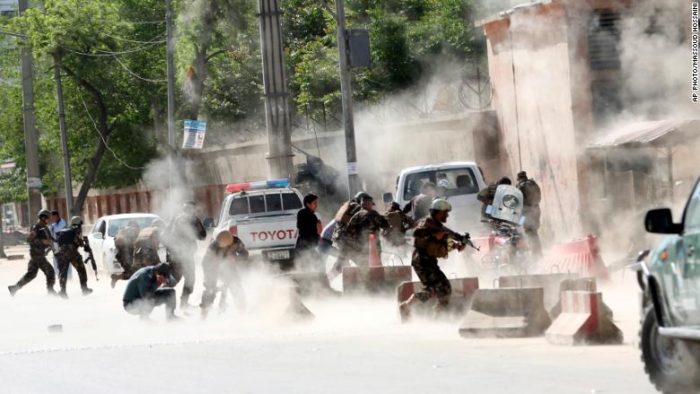

Monday was the deadliest day for journalists anywhere in the world since the attack at the Charlie Hebdo office in 2015.
Nine journalists were killed in suicide bombings in Kabul, Afghanistan. A tenth Afghan journalist was killed in a shooting.
AFP’s chief photographer in Kabul, Shah Marai, was among the dead.
“This tragedy reminds us of the danger that our teams continually face on the ground and the essential role journalists play for democracy,” AFP chief executive Fabrice Fries said in a statement.
The U.S. State Department echoed that message on Monday.
Secretary of State Mike Pompeo condemned the bombings, which killed a total of 30 people. And he specifically cited the deaths of the journalists, saying “the independent media is a cornerstone of democracy.”
“Despite today’s attack, the vibrant media landscape that has developed in Afghanistan will endure, in large part due to those journalists and media professionals who tragically died in today’s attack, but whose courageous and steadfast work helped lay the foundation for Afghanistan’s thriving and resilient independent media,” Pompeo said.
Many of the journalists who were killed on Monday had rushed to the scene of an earlier explosion. That’s when “a bomber disguised as a TV cameraman detonated a second bomb at the site,” CNN reported.
Reporters Without Borders, one of the groups that that advocates for journalist safety, said the attack was the worst of its kind against Afghan journalists “since the fall of the Taliban government in December 2001.”
The organization noted that at least five other journalists were also wounded.
“Killing journalists is an attack on freedom of expression,” Human Rights Watch said Monday. “Under the laws of war, deliberate attacks on civilians are war crimes. Posing as a journalist to carry out an attack is also perfidious, a war crime in which the attacker assumes civilian status.”
Related: BBC reporter and famed photographer among 31 killed in Afghanistan
Separately on Monday, BBC Afghan service reporter Ahmad Shah was shot and killed by gunmen in Khost province.
“This is a devastating loss and I send my sincere condolences to Ahmad Shah’s friends and family and the whole BBC News Afghan team,” BBC World Service director Jamie Angus said. “We are doing all we can to support his family at this very difficult time.”
According to the Committee to Protect Journalists, Monday was the worst single day for journalist killings since terrorists stormed the Paris headquarters of Charlie Hebdo magazine in 2015. Twelve people, including two police officers, were killed in that attack.
Joel Simon, the committee’s executive director, told CNN that the bombing in Kabul “was an attack on the global media.”
“Five of the journalists killed worked for international media outlets,” Simon said. “These are the journalists who keep the world informed. This is true in Afghanistan, but it’s true in conflict zones around the world. It’s a terrible loss for the people of Afghanistan, but it’s a loss for everyone around the globe who cares about the news.”
more recommended stories
 Fentanyl Seizures at Border Continue to Spike, Making San Diego a National Epicenter for Fentanyl Trafficking
Fentanyl Seizures at Border Continue to Spike, Making San Diego a National Epicenter for Fentanyl TraffickingFentanyl Seizures at Border Continue to.
 Utah Man Sentenced for Hate Crime Attack of Three Men
Utah Man Sentenced for Hate Crime Attack of Three MenTuesday, August 8, 2023 A.
 Green Energy Company Biden Hosted At White House Files For Bankruptcy
Green Energy Company Biden Hosted At White House Files For BankruptcyAug 7 (Reuters) – Electric-vehicle parts.
 Former ABC News Reporter Who “Debunked” Pizzagate Pleads Guilty of Possessing Child pδrn
Former ABC News Reporter Who “Debunked” Pizzagate Pleads Guilty of Possessing Child pδrnFriday, July 21, 2023 A former.
 Six Harvard Medical School and an Arkansas mortuary Charged With Trafficking In Stolen Human Remains
Six Harvard Medical School and an Arkansas mortuary Charged With Trafficking In Stolen Human RemainsSCRANTON – The United States.
 Over 300 People Facing Federal Charges For Crimes Committed During Nationwide Demonstrations
Over 300 People Facing Federal Charges For Crimes Committed During Nationwide DemonstrationsThe Department of Justice announced that.
